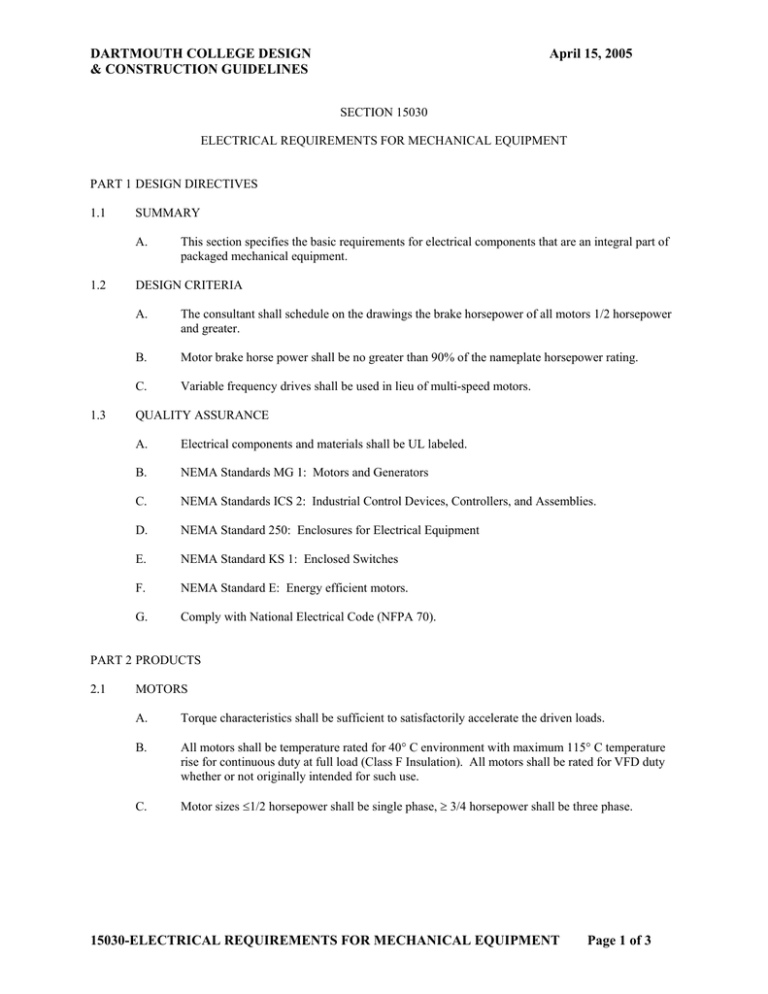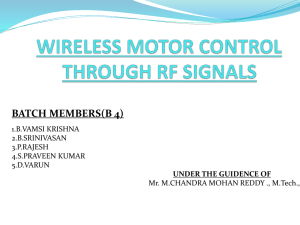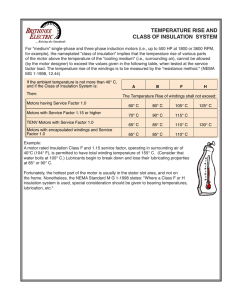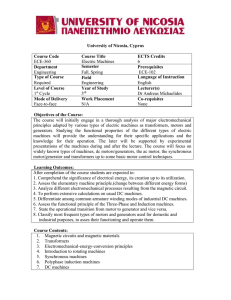DARTMOUTH COLLEGE DESIGN April 15, 2005
advertisement

DARTMOUTH COLLEGE DESIGN & CONSTRUCTION GUIDELINES April 15, 2005 SECTION 15030 ELECTRICAL REQUIREMENTS FOR MECHANICAL EQUIPMENT PART 1 DESIGN DIRECTIVES 1.1 SUMMARY A. 1.2 1.3 This section specifies the basic requirements for electrical components that are an integral part of packaged mechanical equipment. DESIGN CRITERIA A. The consultant shall schedule on the drawings the brake horsepower of all motors 1/2 horsepower and greater. B. Motor brake horse power shall be no greater than 90% of the nameplate horsepower rating. C. Variable frequency drives shall be used in lieu of multi-speed motors. QUALITY ASSURANCE A. Electrical components and materials shall be UL labeled. B. NEMA Standards MG 1: Motors and Generators C. NEMA Standards ICS 2: Industrial Control Devices, Controllers, and Assemblies. D. NEMA Standard 250: Enclosures for Electrical Equipment E. NEMA Standard KS 1: Enclosed Switches F. NEMA Standard E: Energy efficient motors. G. Comply with National Electrical Code (NFPA 70). PART 2 PRODUCTS 2.1 MOTORS A. Torque characteristics shall be sufficient to satisfactorily accelerate the driven loads. B. All motors shall be temperature rated for 40° C environment with maximum 115° C temperature rise for continuous duty at full load (Class F Insulation). All motors shall be rated for VFD duty whether or not originally intended for such use. C. Motor sizes ≤1/2 horsepower shall be single phase, ≥ 3/4 horsepower shall be three phase. 15030-ELECTRICAL REQUIREMENTS FOR MECHANICAL EQUIPMENT Page 1 of 3 DARTMOUTH COLLEGE DESIGN & CONSTRUCTION GUIDELINES April 15, 2005 D. All motors shall conform with the following service factors: Phase Motor HP Service Factor Three All 1.15 1.25 1/2 →1 Single 1.35 1/6 →1/3 1.4 1/20 →1/8 E. Motor construction: NEMA Standard MG 1, general purpose, continuous duty, Design "E". F. Bearings: 1. Ball or roller bearings with inner and outer shaft seals. 2. For fractional horsepower, light duty motors, sleeve type bearings are permitted in nonbelt drive applications. 3. Greasable, except permanently sealed where motor is normally inaccessible for regular maintenance. 4. Designed to resist thrust loading where belt drives or other drives produce lateral or axial thrust in motor. G. Single speed NEMA design B motors shall have efficiency ratings based on ANSI/IEEE 1121984, test method B, using NEMA MG 1-1993, with all current revisions. All motors shall conform to the following: OPEN DRIP PROOF MOTORS (ODP) HP 1 1.5 2 3 5 7.5 10 15 20 25 30 40 50 60 75 100 125 150 200 1200 RPM 82.5% 86.5% 87.5% 88.5% 89.5% 90.2% 91.7% 91.7% 92.4% 93.0% 93.6% 94.1% 94.1% 94.5% 94.5% 95.0% 95.0% 95.4% 95.4% 1800 RPM 85.5% 86.5% 86.5% 89.5% 89.5% 91.0% 91.7% 93.0% 93.0% 93.6% 94.1% 94.1% 94.5% 95.0% 95.0% 95.4% 95.4% 95.8% 95.8% 3600 RPM 77.0% 84.0% 85.5% 85.5% 86.5% 88.5% 89.5% 90.2% 91.0% 91.7% 91.7% 92.4% 93.0% 93.6% 93.6% 93.6% 94.1% 94.1% 95.0% 15030-ELECTRICAL REQUIREMENTS FOR MECHANICAL EQUIPMENT Page 2 of 3 DARTMOUTH COLLEGE DESIGN & CONSTRUCTION GUIDELINES April 15, 2005 TOTALLY ENCLOSED FAN COOLED EXPLOSION PROOF MOTORS (TEFC) HP 1200 RPM 1800 RPM 3600 RPM 1 82.5% 85.5% 77.0% 1.5 87.5% 86.5% 84.0% 2 88.5% 86.5% 85.5% 3 89.5% 89.5% 86.5% 5 89.5% 89.5% 88.5% 7.5 91.0% 91.7% 89.5% 10 91.0% 91.7% 90.2% 15 91.7% 92.4% 91.0% 20 91.7% 93.0% 91.0% 25 93.0% 93.6% 91.7% 30 93.0% 93.6% 91.7% 40 94.1% 94.1% 92.4% 50 94.1% 94.5% 93.0% 60 94.5% 95.0% 93.6% 75 94.5% 95.4% 93.6% 100 95.0% 95.4% 94.1% 125 95.0% 95.4% 95.0% 150 95.8% 95.8% 95.0% 200 95.8% 96.2% 95.4% 2.2 H. All motors, 1 horsepower and larger, shall have a minimum 85% power factor rating I. The nameplate shall be embossed metal and shall indicate the full identification of manufacturer, ratings, characteristics, construction, special features, nominal full load motor efficiency and similar information. Provide nameplate data for each motor installed in the O&M Manual. STARTERS, ELECTRICAL DEVICES, AND WIRING A. Refer to DC Standards Division 16480, ‘MOTOR CONTROLLERS’, for requirements. PART 3 EXECUTION (Not Applicable) END OF SECTION 15030 15030-ELECTRICAL REQUIREMENTS FOR MECHANICAL EQUIPMENT Page 3 of 3


